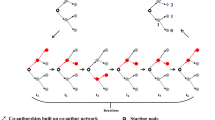Abstract
In our daily life, people usually want to find someone to collaborate with for the purpose of information sharing or work cooperation. Studies show social relationships play an important role in people’s collaborations. Therefore, when finding appropriate experts for a user, two aspects of an expert candidate should be considered: the expertise and the social relationship with the user. One basic model is to filter out expert candidates by one aspect and rank them by the other (FOM). Another basic model tries to combine them using linear combination method (LCM). Both models as baselines here fail to exploit the intrinsic characteristic of social relationships for the tradeoff between two above aspects. In this paper, we formally define two factors respectively (i.e., expert authority and closeness to user) and propose a novel model called friend recommendation model (FRM) which tightly combines both factors in a natural friend recommendation way and is formalized by probability and Markov Process theories. Experiments were carried out in a scenario that a user looks for coauthors in the academic domain. We systematically evaluated the performances of these models. Experimental results show FRM outperforms other two basic models in finding appropriate experts.
Access this chapter
Tax calculation will be finalised at checkout
Purchases are for personal use only
Preview
Unable to display preview. Download preview PDF.
Similar content being viewed by others
References
Balog, K., Azzopardi, L., Rijke, M.D.: Formal models for expert finding in enterprise corpora. In: SIGIR (2006)
Bao, S., Duan, H., Zhou, Q., Xiong, M., Cao, Y., Yu, Y.: A Probabilistic Model for Fine-Grained Expert Search. In: ACL (2008)
Borgatti, S.P., Cross, R.: A Relational View of Information Seeking and Learning in Social Networks. Management Science (2003)
Brin, S., Page, L.: The Anatomy of a Large-Scale Hypertextual Web Search Engine. Computer Networks (1998)
Campbell, C.S., Maglio, P.P., Cozzi, A., Dom, B.: Expertise identification using email communications. In: CIKM (2003)
Cross, R., Parker, A.: The Hidden Power of Social Networks. Harvard Business School Press, Boston (2004)
Fang, H., Zhai, C.: Probabilistic Models for Expert Finding. In: Amati, G., Carpineto, C., Romano, G. (eds.) ECIR 2007. LNCS, vol. 4425, pp. 418–430. Springer, Heidelberg (2007)
Fox, E.A., Shaw, J.A.: Combination of Multiple Searches. In: TREC (1993)
He, J., Li, M., Zhang, H., Tong, H., Zhang, C.: Manifold-ranking based image retrieval. ACM Multimedia (2004)
Kautz, H.A., Selman, B., Shah, M.A.: Referral Web: Combining Social Networks and Collaborative Filtering. Commun. ACM (1997)
Kleinberg, J.M.: Authoritative Sources in a Hyperlinked Environment. In: SODA (1998)
Lin, C., Cao, N., Liu, S., Papadimitriou, S., Sun, J., Yan, X.: SmallBlue: Social Network Analysis for Expertise Search and Collective Intelligence. In: ICDE (2009)
Macdonald, C., Ounis, I.: Voting for candidates: adapting data fusion techniques for an expert search task. In: CIKM (2006)
McDonald, D.W., Ackerman, M.S.: Expertise recommender: a flexible recommendation system and architecture. In: CSCW (2000)
Milgram, S.: The small world problem. Psychology Today (1967)
Tong, H., Faloutsos, C., Pan, J.: Random walk with restart: fast solutions and applications. Knowl. Inf. Syst. (2008)
Tong, H., Faloutsos, C.: Center-piece subgraphs: problem definition and fast solutions. In: KDD (2006)
Zhang, J., Tang, J., Li, J.: Expert Finding in a Social Network. In: Kotagiri, R., Radha Krishna, P., Mohania, M., Nantajeewarawat, E. (eds.) DASFAA 2007. LNCS, vol. 4443, pp. 1066–1069. Springer, Heidelberg (2007)
Author information
Authors and Affiliations
Editor information
Editors and Affiliations
Rights and permissions
Copyright information
© 2011 Springer-Verlag Berlin Heidelberg
About this paper
Cite this paper
Zhan, Z., Yang, L., Bao, S., Han, D., Su, Z., Yu, Y. (2011). Finding Appropriate Experts for Collaboration. In: Wang, H., Li, S., Oyama, S., Hu, X., Qian, T. (eds) Web-Age Information Management. WAIM 2011. Lecture Notes in Computer Science, vol 6897. Springer, Berlin, Heidelberg. https://doi.org/10.1007/978-3-642-23535-1_29
Download citation
DOI: https://doi.org/10.1007/978-3-642-23535-1_29
Publisher Name: Springer, Berlin, Heidelberg
Print ISBN: 978-3-642-23534-4
Online ISBN: 978-3-642-23535-1
eBook Packages: Computer ScienceComputer Science (R0)




